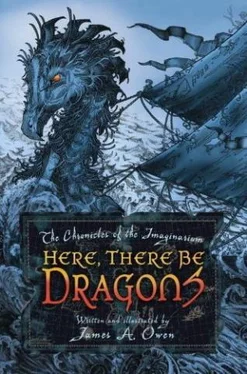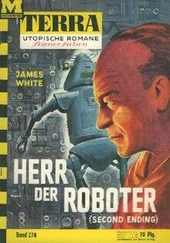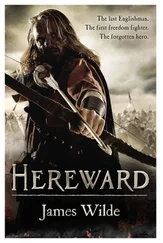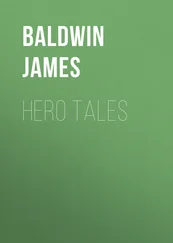James Owen - Here, There Be Dragons
Здесь есть возможность читать онлайн «James Owen - Here, There Be Dragons» весь текст электронной книги совершенно бесплатно (целиком полную версию без сокращений). В некоторых случаях можно слушать аудио, скачать через торрент в формате fb2 и присутствует краткое содержание. Город: USA, Год выпуска: 2006, ISBN: 2006, Издательство: Simon & Schuster, Жанр: Фэнтези, на английском языке. Описание произведения, (предисловие) а так же отзывы посетителей доступны на портале библиотеки ЛибКат.
- Название:Here, There Be Dragons
- Автор:
- Издательство:Simon & Schuster
- Жанр:
- Год:2006
- Город:USA
- ISBN:978-1416912279
- Рейтинг книги:5 / 5. Голосов: 1
-
Избранное:Добавить в избранное
- Отзывы:
-
Ваша оценка:
- 100
- 1
- 2
- 3
- 4
- 5
Here, There Be Dragons: краткое содержание, описание и аннотация
Предлагаем к чтению аннотацию, описание, краткое содержание или предисловие (зависит от того, что написал сам автор книги «Here, There Be Dragons»). Если вы не нашли необходимую информацию о книге — напишите в комментариях, мы постараемся отыскать её.
Pursued by strange and terrifying creatures, the companions flee London aboard the Dragonship. Traveling to the very realm of the imagination itself, they must learn to overcome their fears and trust in one another if they are to defeat the dark forces that threaten the destiny of two worlds. And in the process, they will share a great adventure filled with clues that lead readers to the surprise revelation of the legendary storytellers these men will one day become.
An extraordinary journey of myth, magic, and mystery, Here, There Be Dragons introduces James A. Owen as a formidable new talent.
Here, There Be Dragons — читать онлайн бесплатно полную книгу (весь текст) целиком
Ниже представлен текст книги, разбитый по страницам. Система сохранения места последней прочитанной страницы, позволяет с удобством читать онлайн бесплатно книгу «Here, There Be Dragons», без необходимости каждый раз заново искать на чём Вы остановились. Поставьте закладку, и сможете в любой момент перейти на страницу, на которой закончили чтение.
Интервал:
Закладка:
…the members of the Parliament filed in and took their seats…
Chapter Six
The Tick-Tock Parliament
“If that is true, then we may be lost,” said Bert. “Only a trained Caretaker can properly navigate a ship through the Archipelago of Dreams. The maps and notations are in a dozen languages, many of them long dead. There are very few people living who could make any sense of it at all.”
The lines could not have been more clearly drawn: Aven, Bert, and, and surprisingly, Jack on one side; John, Charles, and Bug on the other.
“Jack?” Charles said, a note of astonished surprise in his voice. “You can’t be siding with them. After all…” He began to say something, then seemed to reconsider, adding only a soft admonishment. “Bad form, Jack.”
“But Aven’s right,” said Jack. “We were chased out of London, running for our very lives, all because of him and that book. His teacher was killed for it. The entire Indigo Dragon was nearly just destroyed for it. And this entire…wherever we are, may be going to war over it. And he’s supposed to be the only one alive who can read it, and he’s failed.”
“Jack!” Charles said. “That’s quite enough.”
“But he’s right,” said John. “I have failed.”
Aven swore and reached for her broadsword, but Bert inter-ceded and held her arm. “There has to be an explanation, Aven. I’m the one who chose him.
“John,” Bert said, unable to hide the pleading in his voice, “I have read your work. You have the gift, I know it. And Stellan knew it too. That’s why he agreed to take you on. Why, I’ve seen the correspondence myself—he was training you.”
“Yes,” John said, “he was. But I wasn’t learning—not as I should have, at any rate.”
He turned to Charles and Jack, resigned. “It never seemed to be important,” he explained. “Ancient languages that no one else could read…Who could have imagined there would ever be a need? My friends at home, even my wife—they all questioned the wisdom of spending so much time on what seemed to be impractical pursuits.”
“Not so impractical now, is it?” Jack said.
“For God’s sake, Jack,” said John. “There is a war on! I could hardly be expected to spend what little free time I had reading and translating manuscripts in Old Teutonic.”
“Men will die because you didn’t,” Aven said. “And perhaps already have.”
“He doesn’t care,” Jack said.
“Yes, I do!” John shouted, grabbing Jack by the coat. “I do care, you fool! I have seen men die! I have felt the spray of their blood on my face as men I laughed with, ate with, sheltered with, died in front of me! Can you say the same?”
They were both shaking. John’s face had broken out in a sweat, and his breathing was fast and shallow. After a moment he released Jack and dropped his head into his hands.
“I’m sorry, Jack,” John said after a time. “I do feel as if I’ve failed all of you—but the professor most of all. Believe me, I didn’t know…I never knew what—”
“Enough, John,” said Charles, putting his arm around his companion’s shoulder. “Let’s all take a little while to compose ourselves, and then maybe we can have a look and decipher it together. Three heads are better than one, and all that. What do you say, Jack?”
But when they looked up, Jack and Aven had already moved to another part of the ship, commiserating. Bert stood in the doorway of the cabin, eyes downcast, caught in the middle of his hope and his fear. Only Bug remained with them, wanting to help, but obviously swept up in something bigger than his experience could provide for.
The fellowship had been broken. And there was nothing any of them could do but continue sailing toward Paralon.
Despite his positive demeanor, after an hour with the Geographica even Charles had to admit he was at a loggerheads with it. His editorial position at the Oxford University Press had allowed him a great deal of experience with Latin, so those passages and some of the Greek phrases were not totally undecipherable—not that it helped much.
“I also get a smattering of Old English, and a few words of Hebrew, but the rest is dead impossible,” said Charles. “There are a great deal of annotations in modern English, but there’s no hierarchy to it, no order, other than a rough chronological one.”
This pronouncement did little to assuage John’s melancholy mood, or Jack’s defiant one. Bert was still subdued, but hopeful. “Look,” he said, “since Paralon is the ‘capital’ of the Archipelago, its map has been extensively annotated in English.
“I myself have added to the listing, so I can read most of it myself from past experience. Besides,” he added, “we’re already pointed in the right direction, so we should make it that far without incident. After we’re there, then perhaps we can locate a scholar, or appeal to the Parliament for access to the king’s archives and library for help.
“Cheer up lad,” he finished. “We still have options.”
“Maybe,” Bug offered from the nook in the cabin where he’d been observing, “the Council will decide on a new king, and you won’t have to worry about it anymore.”
“Think good thoughts, lad,” Bert said as he left the cabin, closing the door behind him.
The sun was nearing the apex of its arc across the sky when the crewman in the crow’s nest called out, “Land, ho!”
They had arrived at Paralon.
The island was far larger than Avalon, or any of the Shadowed Lands they had passed. In the distance a mountain range could be made out, as well as the dark greens of what could only be great forests. The vista was stunning enough that even the taci-turn fauns paused in their labors to watch as they approached.
The harbor toward which they sailed was formed around a natural river basin that emptied into the sea, just deep enough for ships to moor. The ground beyond sloped up gently to a landscape of low rolling hills and fields, then abruptly shifted to a domineering ridge of plateaus that rose straight up from the valley floor.
On the tallest of these stood a massive stone fortress, gray and forbidding: The Castle of Paralon, wherein sat the Silver Throne of the High King of the Archipelago.
This was not Camelot, as they had suspected it might resemble, but something far more primal, which shimmered with the raw energies of living myth. It was the archetype of archetypes; Paralon was the reality that the legend of Camelot aspired to be.
“Dear Lord,” Charles breathed. “It’s magnificent.”
John and Jack both nodded in agreement. Even Mad King Ludwig had never imagined a castle such as this.
“There are a number of ships in the harbor,” Aven noted. “The council may already have begun.”
“So this Paralon,” Charles said as they began to disembark, “is the largest military power in the Archipelago?”
“Why would you think that?” Bert said in surprise.
“How else would it become the locus of power?”
“See those forests in the distance?” Bert asked. “Apple orchards—hundreds, if not thousands, of years old. Military might is transferable, losable, comes and goes. But good produce,” he finished with a wink, “good produce is very difficult to attain.”
Jack busied himself trying to be helpful to Aven, who did her best to ignore him without seeming to. His reckless but successful move during the encounter with the Winter King, as well as his sympathetic distancing from John, had emboldened him, much to her dismay.
Bert helped a still downcast John secure the Geographica inside a sturdy leather case with straps that could be slung over his shoulders for easier carrying, which Bug offered to do. He took his role as John’s squire seriously and was attentive to any ways he might be helpful. Besides, there was no way to suggest that he stay behind—not when the prospect of seeing real knights and kings lay before him.
Charles was already at the far end of the dock, where a small figure was cursing and banging at the insides of an odd contraption that appeared to be the offspring of a clockwork automobile and Cinderella’s pumpkin carriage.
“Keep at it,” Charles said. “I’m sure you’ll get whatever the trouble is sorted out.”
“I’ll do my best, which is all any of us can do, in’t it?” came the reply.
Charles yelped and jumped back as he realized the creature that had answered him was not a man, or even one of the fauns.
It was a badger. In a vest and waistcoat, walking upright, with a pince-nez in one eye and spats on both furred feet.
Charles was still stammering in disbelief as the others came up behind.
“A waistcoat, but no trousers?” John asked.
“It’s very impolite to take notice,” said Bert.
“Be ye royalty types, or officious emissaries?” the badger asked.
“Scholars,” said Charles. “We be…ah, that is, we are scholars.”
“Scowlers, are ye?” said the badger. “And whereabouts do you do yer scowlerin’?”
“Ah, Oxford, actually,” Charles said.
The animal seemed to take this as a matter of course. “Oh yes, Oxford. A place of scowlerly knowledge and Druidcraft. Lord Pryderi of the race of Man was an Oxford scowler.”
“And you,” said Jack. “What’s your name?”
“Pardon my manners, young scowler,” said the badger with a gesture that was halfway between a squat and a bow. “I be called Tummeler, and Tummeler is me.”
“Pleased to meet you, Mr. Tummeler,” said Jack, who, to the badger’s delight, shook his proffered paw. “I’m Jack. These lot are my friends and fellow, ah, ‘scowlers,’ John, and Charles, and our captain, Aven. The fellow with the hat is Bert.”
“Welcome, scowler Jack and all,” said Tummeler. “Be ye here for the Council?”
“We are,” said Bert. “Has it begun?”
“Not yet,” said Tummeler, “as a number of designates such as y’rselves are only just arrived, and the Council at Paralon asked ol’ Tummeler to escort any last-minute princely sorts and emissaries as may be expectin’ to attend.”
He beckoned at them with a paw and turned away. “This way, if you please, young scowlers and company. The Council awaits.”
In short order Tummeler had the vehicle running (with a discreet assist from Aven, who didn’t want to embarrass the small mammal in front of visitors by pointing out that a clump of badger fur was obscuring one of the contacts in the engine) and they started across the valley to the castle.
“We calls ’em principles,” said Tummeler, referring to the steam-belching vehicle in which they traveled. “As in, ‘you can get from here to there, but it’s easier to do it with principles.’ That’s in general. This ’un,” he continued proudly, “I calls the Curious Diversity.”
“Fascinating,” said Charles. “How does it run?”
“Well enough for all practical porpoises,” said Tummeler.
“No—I mean, what gives it motive power?”
“We gots to go somewheres,” Tummeler replied. “What gives you motive power?”
“I—I just decide to go where I need to, and then I do,” Charles stammered.
“Well, it’s the same with principles,” said Tummeler, “’cept I do the decidin’.”
Aven smiled. “It’s a design manufactured by one of his predecessors,” she said, tilting her chin at John. “There is an element of steam involved, and often electricity, but no one truly knows how they run. Bacon only passed on the secret of their construction to certain animals and to Nemo. The animals can’t explain it well enough, and Nemo has never shared.”
“Bacon?” said John. “Do you mean Roger Bacon, the Franciscan friar? He was a Caretaker too?”
Tummeler nodded. “As I be telling you—always good eggs they be, those Oxford scowlers.”
The Curious Diversity passed through an immense stone gate, bracketed by two equally massive statues. The statues’ left hands were outstretched in a gesture of warding; their right hands were held closer to the breast in a gesture of beckoning.
“Th’ Great Kings of Paralon,” said Tummeler. “There be two outside each of the gates as th’ compass spins—east, west, north, and south.”
“Incredible,” said John.
“Hah!” said Tummeler. “Wait’ll y’ see th’ Great Hall.”
When the Silver Throne was first established, Bert explained as they traveled, Arthur ruled from a modest castle on the island of Avalon. It was his eldest son, Artigel, who moved the seat of rule to Paralon, where he enlisted the Dwarves to build a great city.
The streets were paved, and as they entered they saw a number of other principles, each of their own unique make, chugging along the roadways. The buildings they passed were white stone and glass, and all were topped with soaring roofs and towers.
The main castle, which they had sighted from the harbor, was not built atop the plateau, but carved from it, into it, through it. It was a remarkable feat of engineering. Tummeler parked the Curious Diversity on a broad avenue at the intersection of streets below the towering edifice and motioned them to a bridge that led to two great applewood doors.
“Here,” he said, gesturing with a paw. “I’ll be waitin’ here f’r when all’s said an’ all’s done. One word of warning,” the badger added. “Watch out for one in partic’lar. Th’ one called Arawn, that is. Eldest son of the old Troll King Sarum. He’s a bad ’un. Bad from the get-go, and bad to the core. He’s been calling for a full council for several years, and he has made it no secret that he thinks the time of Men is past, and a new High King should be chosen from one of the other races.
“It don’t take a scowler,” Tummeler finished, “to guess who he thinks should get the job. Good luck to you all, master scowlers.”
There were a thousand different races in the Archipelago, Bert explained—more if you included the animals. But only the four great races were allowed to send formal emissaries to the Council: the Trolls, the Goblins, the Elves, and the Dwarves.
The fifth race, Men, convened the council out of sheer tradition. Despite the occasional conflicts that arose, all of the races respected Arthur’s lineage, and had accorded that respect to the Parliament during the years since the murder of the old king and his family. But they had grown restless, and each race wanted to claim the Silver Throne for their own.
“Are we going to be allowed?” Charles asked. “We are neither royalty nor emissaries.”
“We’ll be allowed,” said Bert. “I have some standing with the Parliament, and he, after all,” he said, tapping John on the shoulder, “is the Caretaker.”
Aven rolled her eyes and cursed under her breath.
“At least,” Bert added, “he is the bearer of the Imaginarium Geographica. That alone gives him, and you all, a degree of status.”
John sighed and looked at Bug, who smiled supportively.
Together, they entered the Great Hall of Paralon.
Tummeler had not overspoken. The Great Hall was a sight stunning in its grandeur.
Each entry from the four points of the compass opened through arches a hundred feet high, bracketing a great gallery of boxfront seats. Far, far above, the ceiling ended in a crystal window that may have been set atop the plateau itself. Carved into all of the pillars were alcoves bearing torches, illuminating the entire hall in a brilliant white light. It was, in a word, spectacular.
“The Winter King will never get the throne,” Jack murmured to Charles.
“Why not?”
“Because,” said Jack, “he’d have to repaint everything black.”
About half of the seats in the gallery were taken. Bert led the companions to a staircase behind one of the pillars on the left, and they climbed to an open cluster of seats about a third of the way up.
“The central seating is reserved for the human Parliament,” Bert explained. “They’ve yet to arrive, which is good—we’ve not come too late.”
The elves took up the seats to the right of center; they represented the largest number of delegates from any race. They were slender, fair-haired, and fair-skinned, and they bore the aloof demeanor of a race that rarely saw death.
The dwarves sat to the left, above and around the companions. They were shorter and stocky, and well armed. Not a single delegate carried less than two short swords, as well as bows and braces of arrows.
“Keep on their good side,” Bert warned. “They’re a testy lot. Like to pick fights—mostly with elves, though. It’s a height thing.”
“So, uh, you lot built this place, eh?” Jack said to the dwarf sitting three seats over.
“Yes,” said the dwarf.
“Uh, nice work,” said Jack.
“Humph,” snorted the dwarf.
Bert raised a hand in greeting and saw the gesture returned by a greasy, gnarled man dressed in elaborate silken robes sitting high in the center of the gallery.
“Uruk Ko, the Goblin King,” said Bert in explanation. “And entourage.”
“A Goblin King?” John whispered in distaste.
“Oh, he’s an affable enough sort,” said Bert. “Stellan—Professor Sigurdsson—and I once shared a long voyage with him in the southern isles on a ship called the Aurora. It was meant to be an exploratory expedition—mapping for the Geographica and whatnot—that somehow turned into an adventure all of its own.
“But,” he concluded, shrugging, “that’s the sort of thing that happens when the captain is a talking mouse.”
Directly opposite the goblins in the great hall, sitting low in the gallery, was a bulky, dark-visaged personage that could only have been a troll. Thick, corded arms were folded against a massive chest, which was further plated with heavy leather armor. His bearing and manner, as well as the number of supplicants crowded around his elevated chair, indicated that he was in all likelihood a creature of high status, if not the Troll King himself.
“I don’t know him,” Bert said. “Those of the Troll race tend to keep to themselves in the eastern isles of the Archipelago.”
“One guess,” said John. “I’ll bet that’s Tummeler’s Arawn.”
“Quiet,” said Bert. “The Parliament is arriving.”
Entering from a fifth entrance between the east and north gates, the representatives of the Parliament were dressed according to the suits in a deck of cards: clubs, spades, diamonds, and hearts. Somberly, they marched in, looking neither right nor left.
Bert’s brow furrowed as the members of the Parliament filed in and took their seats with the rest of the Council.
“What is it?” John whispered.
“Can’t say,” Bert replied. “Something is amiss, although I can’t quite put my finger on it.”
They watched in silence as the elaborately dressed men and women settled into their places in the gallery. At length a shifty yet officious-looking man—the Steward of Paralon, Bert said—strode to the center of the hall and called for order.
“As Steward of Paralon, I shall oversee these proceedings,” he began. “In the absence of a legitimate heir to the Silver Throne, the Parliament, under my guidance, has ruled Paralon and with it, the Archipelago.
“Now a claim has been made on the throne. A claim of birthright and blood.”
At this there was a great deal of murmuring from the gallery. “What’s that about?” John whispered. “I thought all the heirs were dead.”
“I don’t know,” said Bert. “Listen.”
“The claim,” the Steward continued, “has been approved by the Parliament. If none dissent, by the end of the day we shall have a new High King.”
Calls rang out to the Steward, who waited for the cacophony to die down before addressing them again.
“The claim,” he said, “has been made by one of Arthur’s own kinsmen, and as such ought not to be disputed. While he has had no previous standing with this body, he has nevertheless come to be known by most of you…
“…as the Winter King.”
“Wait,” boomed a voice. It was Bert. “May I speak?”
The Steward grimaced. “The Parliament…,” he began.
“The Parliament,” said Bert, “called a council to debate the matter of succession. Whether or not there is an heir, as you say, we should be allowed to address them.”
“By what right,” asked the Steward, “do you speak?”
“I am one of the Caretakers of the Imaginarium Geographica,” said Bert, “and the other sits beside me.”
This brought many nods, mostly friendly, from the throng. The Steward shook his head. “I appreciate your desire to participate,” he began to say.
“Let him speak,” came a gruff voice. It was Uruk Ko, the Goblin King.
The Steward could bluff and bluster past most of those assembled; he could not, however, stare down an actual king of an entire race. Reluctantly, he bowed and stepped to the side of the hall, casting nervous glances up at the Parliament members.
Bert stood in the center of the Great Hall and faced the gallery. “Ladies and gentlemen of the Parliament,” he began, “I have had direct and recent experience with the man called the Winter King….” But before he could continue, he was cut off by the King of Diamonds, who stood and shook his fist at the other man.
“Unacceptable,” said the king. “The Parliament cannot accept the proposal.”
“Did he make a proposal?” John whispered to Charles. “If so, I missed it.”
Bert seemed similarly puzzled. “Your Majesty, if I have presumed too much—”
“Yes, entirely out of the question,” the king continued, as if he had not heard Bert at all. “A Walrus as High King is preposterous. And everyone knows a Carpenter cannot be High Queen—if we allowed that, then who would organize all of the dances?”
“This is very strange,” said Charles.
“Shush,” said Jack. “Look—another king is rising to speak.”
The King of Spades raised a hand. “Please don’t fire the cannons,” he said, “or I shall never be able to remove the potatoes from my ears.”
The dwarves had begun to murmur, as if they too sensed all was not well.
“They’re all mad,” said Jack. “What is this?”
“I don’t know,” said Aven. “Something is very wrong.”
The Steward was about to escort Bert off the floor, when the Queen of Clubs’s head caught fire. The flames shot high into the air, and yet she remained seated, hands folded, a gentle smile on her face, as if nothing were amiss.
The murmuring that began with the dwarves had now spread to the elves and goblins. And the trolls were beginning to unsheathe their weapons.
The Queen of Hearts, a portly, dark-haired woman, picked up a croquet mallet from under her seat and smashed the King of Hearts in the chest. “I hate roses,” she said. “They never speak when spoken to.”
Bert looked around, but the Steward had disappeared. All throughout the seats, the delegates were rising to their feet, shouting.
One of the trolls overcame his forced decorum and threw a mace directly at the Queen of Hearts. With the impact, her chest split open and spilled a cascade of wheels and cogs onto the floor of the hall, showering the nearby delegates in an explosion of sparks.
The Parliament members were not human at all. They were clockwork constructs.
“A fraud!” boomed the Troll Prince Arawn, standing and shaking his armored fist. “The Council is a fraud!”
In moments the entire Great Hall of Paralon had erupted in chaos.
Интервал:
Закладка:
Похожие книги на «Here, There Be Dragons»
Представляем Вашему вниманию похожие книги на «Here, There Be Dragons» списком для выбора. Мы отобрали схожую по названию и смыслу литературу в надежде предоставить читателям больше вариантов отыскать новые, интересные, ещё непрочитанные произведения.
Обсуждение, отзывы о книге «Here, There Be Dragons» и просто собственные мнения читателей. Оставьте ваши комментарии, напишите, что Вы думаете о произведении, его смысле или главных героях. Укажите что конкретно понравилось, а что нет, и почему Вы так считаете.











